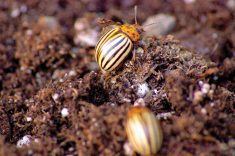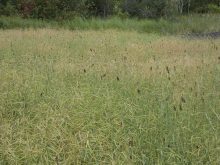A new committee could mean someday politics could override science in how pesticides are regulated in Canada.
So says Pierre Petelle, president and CEO of CropLife Canada, which represents the Canadian manufacturers, developers and distributors of pest control and modern plant breeding products.
Health Canada’s Pest Management Regulatory Agency (PMRA) has created a new Science Advisory Committee on Pest Control Products in Canada. PMRA announced Jan. 27 that it’s seeking experts with a wide range of “relevant knowledge and experience, including pesticide use in Canada, environmental fate and modelling, health risk assessment, or pesticide value assessment, to be nominated to the committee.
Read Also

AAFC organic research program cut
Canada’s organic sector says the loss of a federal organic research program at Swift Current, Sask., will set the industry back.
In a news release Health Minister Jean-Yves Duclos said the committee will make pesticide reviews more transparent and sustainable. But according to Petelle the committee opens the door to political interference from those who oppose pesticides, even if they are determined to be scientifically safe. It’s already happened in the European Union, he added.
“Their (EU) system is completely driven by politics and the science is routinely ignored,” Petelle said. “Again I am not saying we’re there, but this is a very troubling development.”
Why it matters: Pesticides are important tools for Canadian farmers. If politics is allowed to trump science farmers fear they could lose products that control weeds, insects and diseases even if they are safe.
The federal government announced plans for the new advisory council Aug. 4 following sustained media reports, especially in Quebec, after it was announced the maximum residue limit (MRL) for glyphosate was being increased.
A few weeks later it became an election promise.
MRLs often change to harmonize with international standards set by the Codex Alimentarius Commission that sets standards for food safety, Petelle said.
Instead of explaining the rigorous MRL process to the public, the government created a new independent advisory committee potentially undermining confidence in PMRA, he said.
“To us surely the 300 scientists that work at PMRA would be considered independent,” Petelle said. They don’t work for us. To us it puts a black eye on PMRA and those scientists. They are the experts and are world renowned and yet somehow we’re going to pull together five or eight scientists with all the experience of all the different sections within PMRA and somehow have them help with the decision-making process. It makes no sense.”
What happens if PMRA and the committee disagree? Petelle added.
“Does the minister (of health) get involved? It raise a number of troubling questions.”
The decision to “engage” the committee for advice is at PMRA’s discretion, Health Canada said in an email.
“The PMRA retains sole responsibility and authority to make regulatory decisions on pesticides taking into consideration the advice from the committee,” the email says. “Health Canada remains committed to timely, evidence-based decisions on pesticides. Health Canada will make every effort to integrate scientific advice from the committee without impacting existing timelines to reach regulatory decisions.”
The committee’s role is to provide scientific advice for PMRA to consider “for certain evidence-based decisions on pesticides.”
The committee will provide advice to targeted questions from the PMRA related to specific technical aspects of assessments or scientific reviews, the email says.
Some examples include: technical aspects of PMRA human health risk assessments, such as interpretation of adverse effects in toxicology studies; technical aspects of PMRA environmental risk assessments, such as interpretation of physical, chemical and fate parameters; a pesticide’s value in contributing to managing a relevant pest problem in Canada and technical aspects of pesticide risk management options.
Petelle said he’s skeptical that a small committee of scientists can have the same knowledge and expertise that already exists within PMRA.
“I worked at PMRA and those are three very distinctive groups, with very distinctive sets of expertise and PhDs and masters under each of those,” he said. “To think you’re going to have individuals who can actually weigh in on the details on health assessment and turn around and look at environment with all its parameters and then value and understand agronomy. It’s just not realistic.”
















